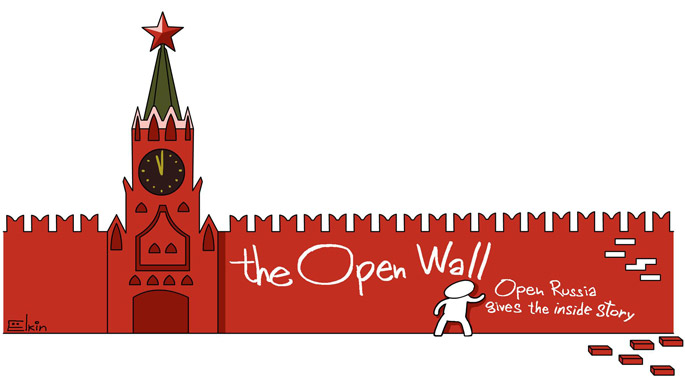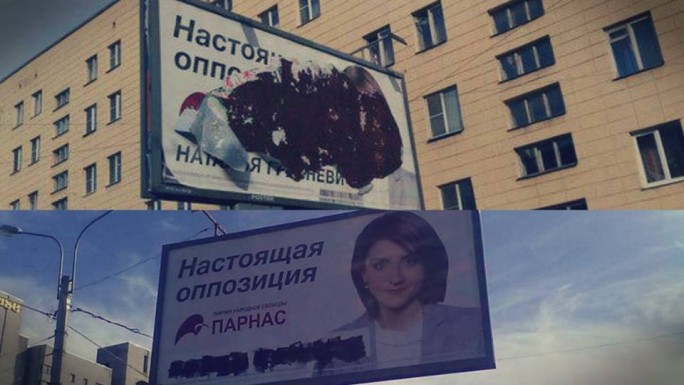The Duma election race is entering its final lap

The Duma election race is entering its final lap
Come Sunday, September 18th, the Kremlin will be claiming that this has been a “free and fair” election. We have our doubts.

August 17 saw the publication in Moscow of a million (!) copies of a newspaper entitled The Capital of United Russia [the party in power]. Even a cursory leaf-through will suffice to confirm that it consists entirely of agitprop in its purest form; the paper, however, is registered as a mass media publication, and the people behind it can therefore claim that legislation regarding campaign materials doesn’t apply to it. Having familiarised themselves with United Russia’s handiwork, opposition party Yabloko complained in the following terms to the Central Electoral Commission: “The law states that campaign materials may feature no photographs save for those of election candidates, and yet this newspaper has used images of other individuals (Putin, for one. – Ed.), some of whom are minors. […] The newspaper also features materials promising benefits to voters exclusively as a result of the actions of United Russia. There is evidence of vote-buying here.” And although the CEC swiftly pledged to investigate, the paper, whose million copies can never be recalled, has already fulfilled its function.
United Russia’s Moscow branch has been very busy making phone calls. Individuals presenting themselves as United Russia campaign HQ personnel call up Muscovites on their landlines and mobiles – and proceed to ask “leading questions:” “It’s very important to support Russia in this difficult time for our country, do you agree that we should all be voting for United Russia?” This kind of canvassing violates Russia’s personal data law. “Some personal data operator – that is, a body with access to information that includes Muscovites’ phone numbers – has provided this intel to United Russia,” says Andrei Buzin, co-chair of the Golos [Voice] movement. “And, given that personal data operators are predominantly state agencies, such canvassing may be regarded as an exploitation of administrative resources.”
Opposition candidates are meanwhile striving to prove their worth in personal meetings with citizens. In Moscow, the authorities have responded to these activities in a largely calm manner (customary provocateurs notwithstanding); in St Petersburg, however, it’s a different matter.
On August 24, a meeting with voters was interrupted when armed police detained Vladimir Kara-Murza (assistant to deputy Dmitry Gudkov), State Duma candidate Andrei Pivovarov, and St Petersburg Legislative Assembly candidate Daniil Ken (the latter two both backed by Open Russia). And although registered Duma candidates and deputies’ assistants can be detained only with permission from the Prosecutor General, the police weren’t about to be side-tracked by such formalities. They were being told what to do by an agent from Moscow’s E Centre [anti-extremism] who’d made the effort to travel to Petersburg in order to assume personal control over the special operation. Ultimately, the oppositionists were told that they’d been holding an unsanctioned event (although this was not the case) and subsequently detained for several hours.
The regions are no better. In Samara Region, current governor Nikolai Merkushkin had previously been head of the republic of Mordovia, where he was able to guarantee eye-popping showings for United Russia (93.4% of the vote in 2007, 91.6% four years later). Keen to put on a good show this time round as well, Merkushkin has thrown his full support behind United Russia, mobilising all his available administrative resources to this end. Kommersant reports that, on its return from Samara, a Presidential Human Rights Council election monitoring group called attention to the blatantly unbalanced allocation of airtime and column inches in the region’s state-controlled media. “Everything’s dominated by the person of the governor and the party he represents,” says monitoring group member Ilya Shablinsky.
The regime also evinces a very active “interest” in the coverage afforded to the opposition. During federal televised debates, for example, spoiler-party speakers will invariably shout down Mikhail Kasyanov [chair of PARNAS], while a compromising wiretap recording (source unknown) will be inserted into a story on the regional state channel GTRK Karelia about Grigory Yavlinsky’s [chair of Yabloko] visit to the republic.
Opposition candidate Dmitry Gudkov describes the work of pro-regime broadcasters: “Today, a crew from TV Tsentr arrived for an evening meeting [with voters]. They set up their camera, they set up their mic – and you know what it was all for? It was all for the sake of asking a question about ‘homos’. Yes, ‘homos’ – in that precise formulation. So they asked their question, got their answer, and off they went.”
There are far fewer opposition billboards in evidence around Russia today than in the run-up to previous major elections. This isn’t merely to do with the fact that these are crisis times, and that expensive outdoor advertising can easily be replaced by web banners. The real explanation is that, in Moscow, many advertising operators are simply refusing to put party posters on street billboards. And the situation in the regions isn’t much better. “We’ve had twenty banners taken down in Nizhnevartovsk,” laments a Just Russia representative, adding that these are quickly replaced by United Russia content.
United Russia personnel have been caught destroying “unfriendly” campaign materials on several occasions over the course of the campaign. Back in Samara, for example, the local administration actually recruits special night brigades for this very purpose, with briefing sessions held directly at United Russia’s campaign HQ. A resourceful ‘recruit’ managed to make an audio recording of one such event, where would-be brigade members were told the following: “Elections sometimes involve breaking the law. We can’t be the ones to break it. We need people who’d act independently of us, who’d be unconnected to us in any way – and that’s where you lot come in.”
Which really sums up this election pretty well.



